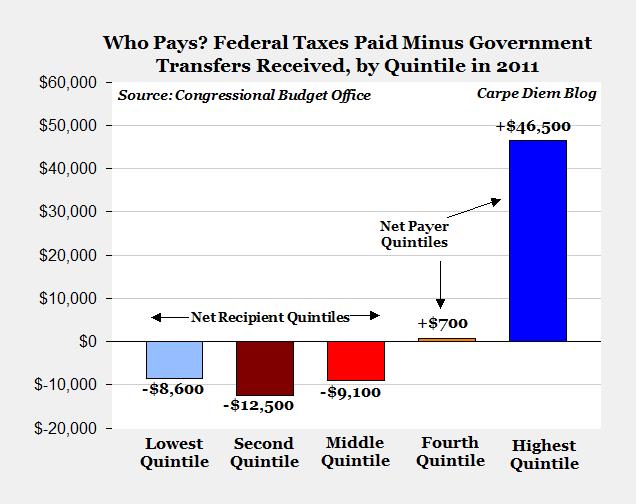As I type, Interstellar is at position 15 on IMDB's top 250 movies of all time. I don't know about that, but it's still pretty good. So Mrs. Salad and I thought it would be a good idea to catch this spectacular flick before it vanished from theaters. It was more comprehensible than it might have been: I'm a subscriber to Wired, and their December 2014 issue was more or less an a spoiler-free ad for Interstellar, with plenty of hints about the speculative science it involved.
Matthew McConaughey plays farmer/widower/ex-astronaut Cooper. He lives with his 10-year-old daughter (Murph) and 15-year-old son (Tom) on a not-too-distant-future dying Earth. Details are a little hazy, but widespread plant blight has caused famine, nasty dust storms, and (worst) a crippling effect on the national psyche. (In an especially poignant bit, it's revealed that Murph's newest school textbooks describe the Apollo program as a hoax, made up by NASA to bankrupt the old Soviet Union. Hey, it worked!)
Mankind's only hope is to get the hell off the planet. But how? Cooper and Murph stumble across a secret government program: what's left of NASA has discovered a wormhole out by Saturn that leads to another galaxy, and there are a number of possibly inhabitable worlds at the other end. The only thing lacking is a skilled astronaut to pilot the ship, and Cooper is quickly recruited. So they're off, with Cooper leaving Murph and Tom behind, on a mission that has small chance of success, and an even smaller chance that Cooper will return to his kids. Tom's OK with that, but Murph is bitter and resentful.
What follows is a heartstring-tugging family drama intertwined with spectacular hard-as-nails science fiction. I'm pretty sure there's never been as much relativistic astrophysics in any other movie. Kip Thorne, who has been a leading researcher in the field for decades, was an advisor to the film, so technical details are as accurate as you're likely to find.
It's pretty much all good. Acting is first-rate (IMDB counts eight Oscar nominees/winners among the cast). And, well, it's Christopher Nolan-directed. My only gripe is that I couldn't understand some of the McConaughey dialogue, some combination of his Texas accent and Cinemagic's poor sound system.
![[4.5 stars]](/ps/images/45stars.gif)
![[IMDb Link]](https://ia.media-imdb.com/images/G/01/imdb/plugins/rating/images/imdb_46x22.png)
![[Amazon Link]](/ps/asin_imgs/B00SI7GDBM.jpg)
![[Amazon Link]](/ps/asin_imgs/B00KYCA4QY.jpg)
![[Amazon Link]](/ps/asin_imgs/0553278398.jpg)
![[3.5 stars]](/ps/images/35stars.gif)
![[Amazon Link]](/ps/asin_imgs/B00RNRD7Y4.jpg)
![[phony baloney]](/ps/images/phony-baloney.jpg)
![[1.0 stars]](/ps/images/10stars.gif)
![[Amazon Link]](/ps/asin_imgs/B00IKM5OCO.jpg)
![[Amazon Link]](/ps/asin_imgs/B00NKHC5RQ.jpg)

![[Amazon Link]](/ps/asin_imgs/B002ZFOM52.jpg)
![[Amazon Link]](/ps/asin_imgs/1416523391.jpg)
![[Amazon Link]](/ps/asin_imgs/B07WDZ5W4R.jpg)
![[Amazon Link]](/ps/asin_imgs/0199371628.jpg)

![[Amazon Link]](/ps/asin_imgs/0743491548.jpg)
![You hate me! You really, really, hate me! [I HATE TEA (PARTIES)]](/ps/images/dem_hatred.png) The Official Store of the Democratic Party has decided
to shed all that phony we-are-all-Americans
rhetoric, and is selling the
The Official Store of the Democratic Party has decided
to shed all that phony we-are-all-Americans
rhetoric, and is selling the ![[Amazon Link]](/ps/asin_imgs/1781859507.jpg)
![[The Blogger and His Dog]](/ps/images/me_with_barney.jpg)



